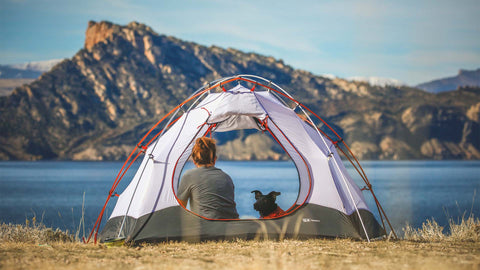Summer is here, and it is a great time to get out into the great outdoors! We cannot think of a better way to enjoy the outdoors other than going camping. If you are an experienced camper, or someone who is new to camping and just wants to get outside, we have some tips for you.
Choosing the Right Campsite
Researching Campground Options Before setting out on your camping trip, it's important to research and choose the right campground for your needs. Consider the type of experience you're seeking. National parks and state parks often provide well-maintained campgrounds with a range of amenities and organized activities. Private campgrounds may offer additional facilities like showers, electricity hookups, and Wi-Fi access. If you prefer a more primitive experience, designated wilderness areas might be ideal. Use online resources, such as campground directories or review websites, and consider using camping apps that provide campground information, reviews, and availability.
Campsite Selection Once you've chosen a campground, it's time to select a suitable campsite within it. Look for a level ground to ensure a comfortable sleep and ease of setting up your shelter. Check if the campground has designated tent sites or RV pads. Consider the proximity to water sources for cooking, drinking, and cleaning purposes. If the weather is hot, look for shade-providing trees or natural shelter to keep your campsite cool. On the other hand, if rain is expected, choose an area that is less prone to flooding. Also, be sure to review any campground regulations regarding maximum occupancy, quiet hours, and specific campfire rules. Some campgrounds may require advance reservations or permits, so be sure to check those details as well.
Essential Camping Gear
Shelter Choosing the right shelter is crucial for a comfortable camping experience. Tents are the most common option for campers. Look for tents that are easy to set up and pack away, with good weather resistance. Consider the size of the tent based on the number of people sharing it. Additionally, invest in a quality sleeping bag that suits the expected weather conditions and a sleeping pad for added comfort. If you prefer an alternative to tents, hammocks are a lightweight and versatile option, especially for solo campers. For those who prefer a more luxurious experience, camper trailers provide a mobile home-away-from-home. However, keep in mind that they require proper towing and setup knowledge.
Cooking Equipment and Food Preparing meals while camping can be a delightful experience. Make sure to pack a camp stove, fuel, and appropriate cookware, such as pots, pans, and utensils. Opt for lightweight and durable options designed for outdoor use. Plan your meals in advance and pack food accordingly. Consider a combination of non-perishable items like canned goods, granola bars, and dried fruits, as well as fresh produce for the first couple of days. Remember to bring a cooler with ice or ice packs for perishable items. Embrace the campfire cooking experience by preparing campfire meals using foil packets or grill grates. Don't forget to practice proper food storage and disposal to avoid attracting wildlife.
Clothing and Personal Items Packing the right clothing and personal items is essential for a comfortable camping trip. Dressing in layers is crucial to adapt to changing weather conditions. Bring moisture-wicking base layers, insulating mid-layers, and a waterproof outer layer. Pack enough socks and underwear for each day, as well as sturdy and comfortable footwear suitable for hiking or walking on uneven terrain. Don't forget essentials like a hat, sunglasses, and sunscreen to protect yourself from the sun. Insect repellent is another must-have item, especially in areas with mosquitoes or ticks. Remember to bring toiletries and personal hygiene products in eco-friendly packaging, and always strive to leave no trace by properly disposing of waste and minimizing your impact on the environment.
Campfire Safety and Outdoor Ethics
Campfire Safety Tips Campfires can provide warmth, light, and a cozy atmosphere while camping. However, it's crucial to follow proper campfire safety guidelines to prevent accidents and minimize environmental impact. Start by checking if the campground allows campfires and if there are designated fire rings or pits. Clear the area around the fire ring from any flammable materials, and never leave the fire unattended. When extinguishing the fire, use water or sand and ensure it is completely out before leaving the campsite. Familiarize yourself with any fire regulations or local restrictions in the area you're camping. By following these guidelines, you can enjoy the beauty of a campfire responsibly.
Leave No Trace Principles As responsible campers, it's important to practice Leave No Trace principles to preserve the natural environment for future generations. The seven Leave No Trace principles include:
- Plan ahead and prepare: Proper planning helps minimize waste and damage to the environment.
- Travel and camp on durable surfaces: Stick to designated trails and campsites to avoid trampling fragile vegetation.
- Dispose of waste properly: Pack out all trash, including food waste and toilet paper. Follow campground rules for waste disposal.
- Leave what you find: Do not disturb natural features, plants, or historical artifacts. Take only pictures, leave only footprints.
- Minimize campfire impacts: Use established fire rings or pits, keep fires small, and only burn untreated wood. Never leave a fire unattended.
- Respect wildlife: Observe animals from a distance and do not feed them. Store food securely to prevent wildlife encounters.
- Be considerate of other visitors: Respect quiet hours, avoid excessive noise, and be courteous to fellow campers.
By following these principles, you can help protect the natural beauty of the outdoors and ensure that others can enjoy it too.
Outdoor Activities and Recreation
Hiking and Exploring Nature One of the most popular activities while camping is hiking and exploring the surrounding nature. Before setting off on a hike, research the trails available in the campground or nearby areas. Start with shorter, well-marked trails if you're a beginner, and gradually increase the difficulty level as you gain more experience. Wear appropriate footwear and clothing, and carry essentials like a map, compass, first aid kit, and plenty of water. Respect trail etiquette by yielding to other hikers, staying on designated paths, and avoiding shortcuts that can erode the terrain. Remember to leave the environment as you found it and be mindful of wildlife habitats.
Water Activities If your campground is located near a lake, river, or ocean, take advantage of water-based activities. Swimming is a great way to cool off on hot days, but always exercise caution and be aware of any water currents or hazards. If you plan on boating or canoeing, ensure you have the necessary safety equipment, including life jackets. Fishing can also be a rewarding experience, but make sure to check local fishing regulations and obtain any required licenses. Remember to practice catch-and-release to preserve fish populations. Lastly, be mindful of water conservation and leave water sources clean for others to enjoy.
In conclusion, camping provides a unique opportunity to connect with nature, unwind from the daily hustle, and create lasting memories. By choosing the right campsite, packing essential gear, following campfire safety guidelines, practicing Leave No Trace principles, and engaging in outdoor activities responsibly, you can have a successful and enjoyable camping experience. Embrace the beauty of the great outdoors, and remember to leave the campsite just as pristine as you found it. Now, armed with this beginner's guide to camping, it's time to plan your first adventure and immerse yourself in the wonders of nature. Happy camping!

